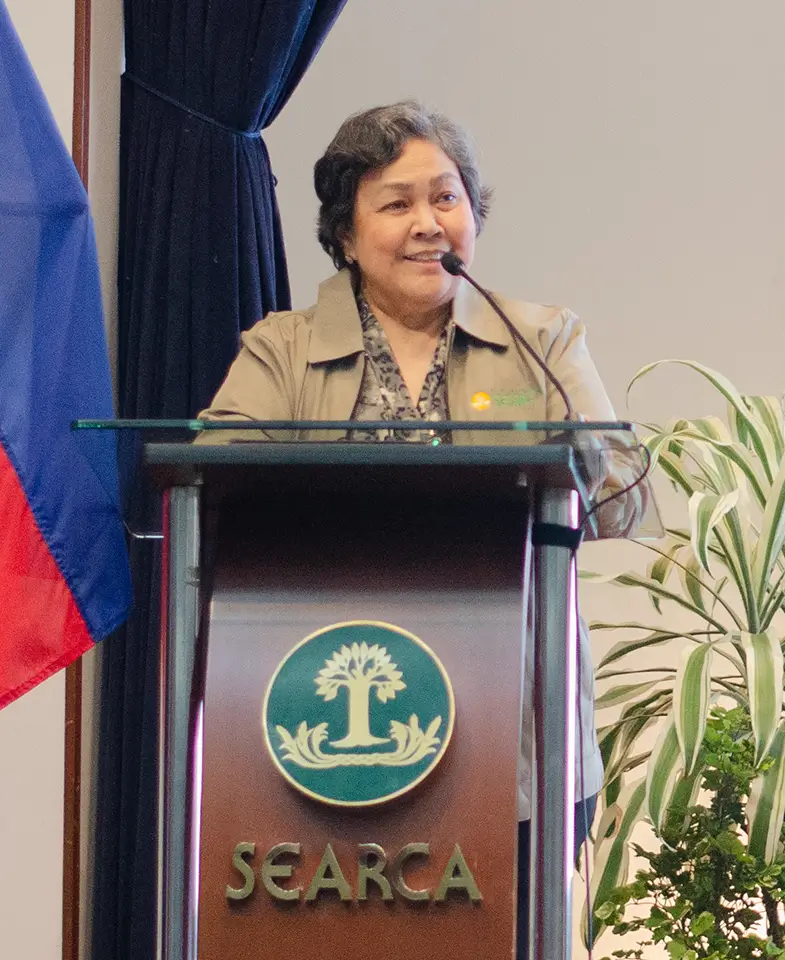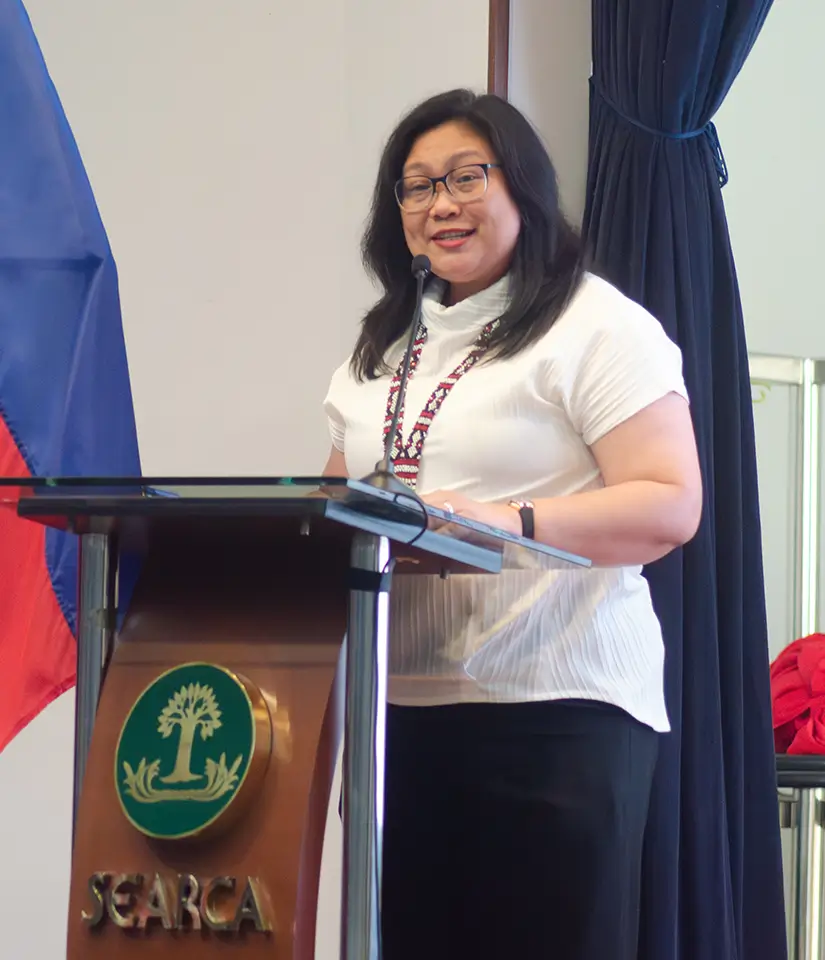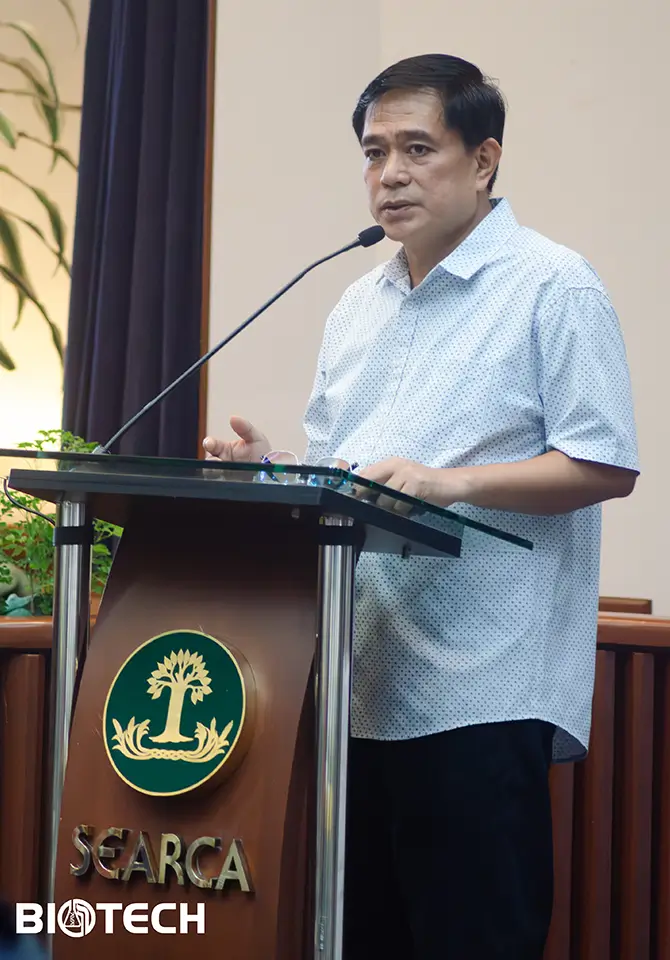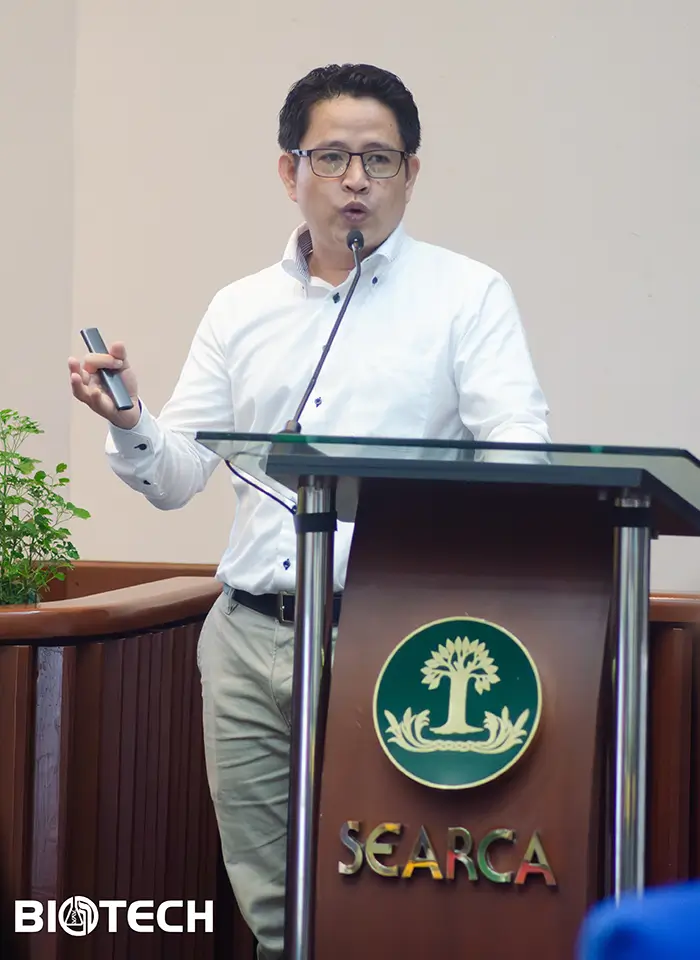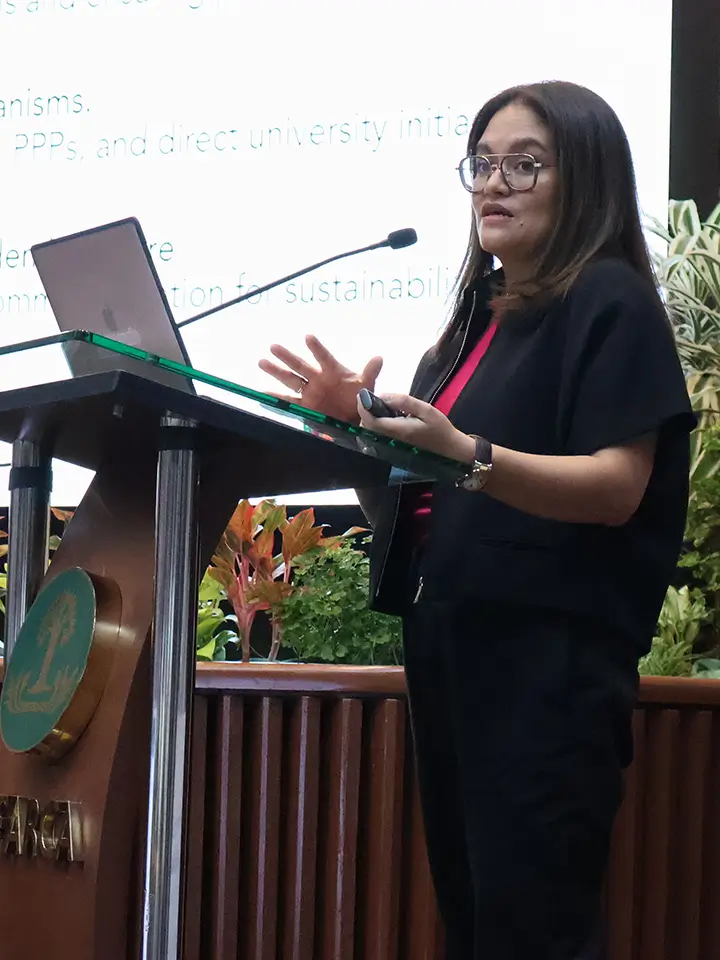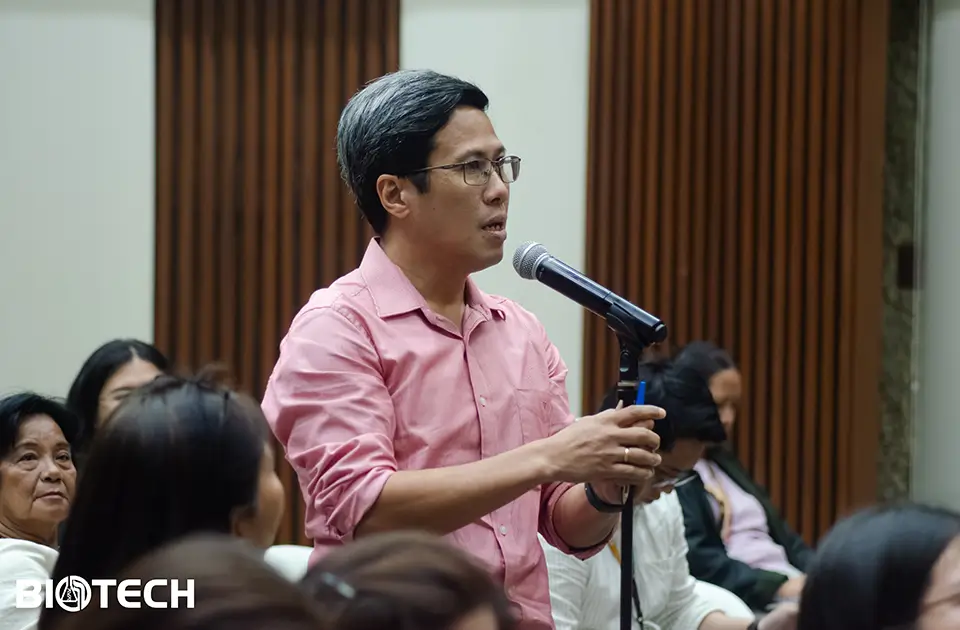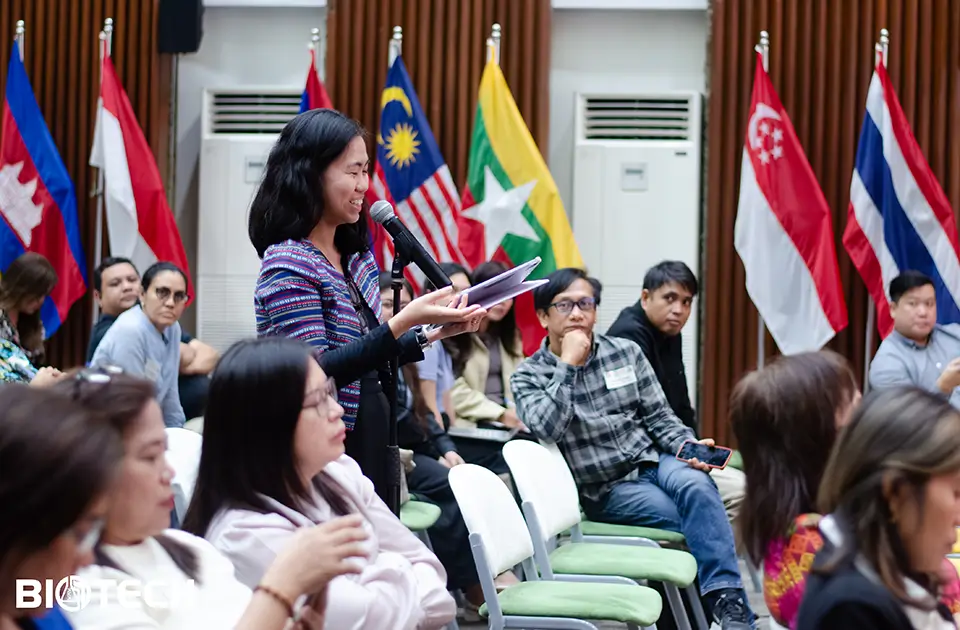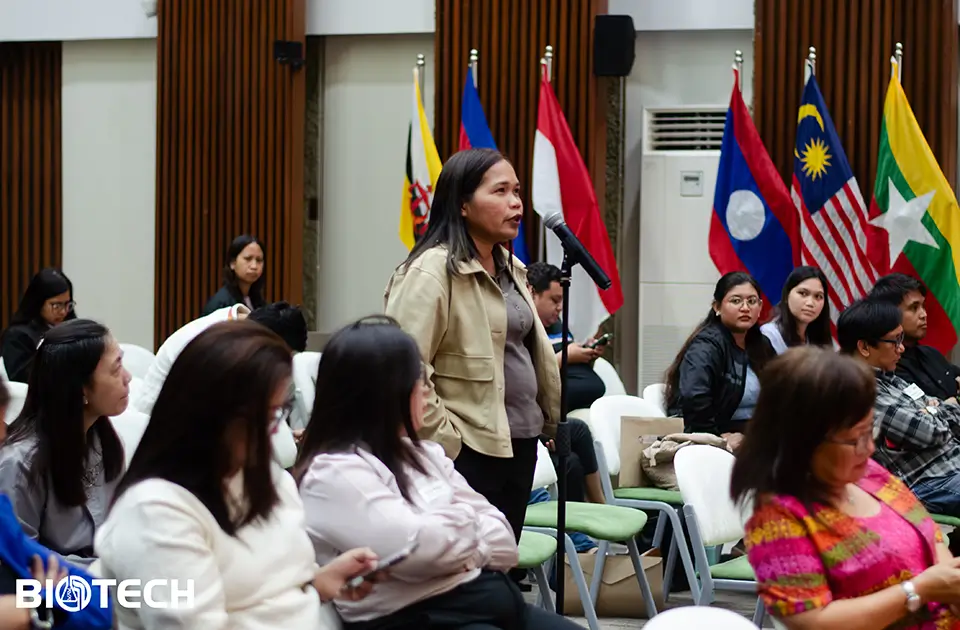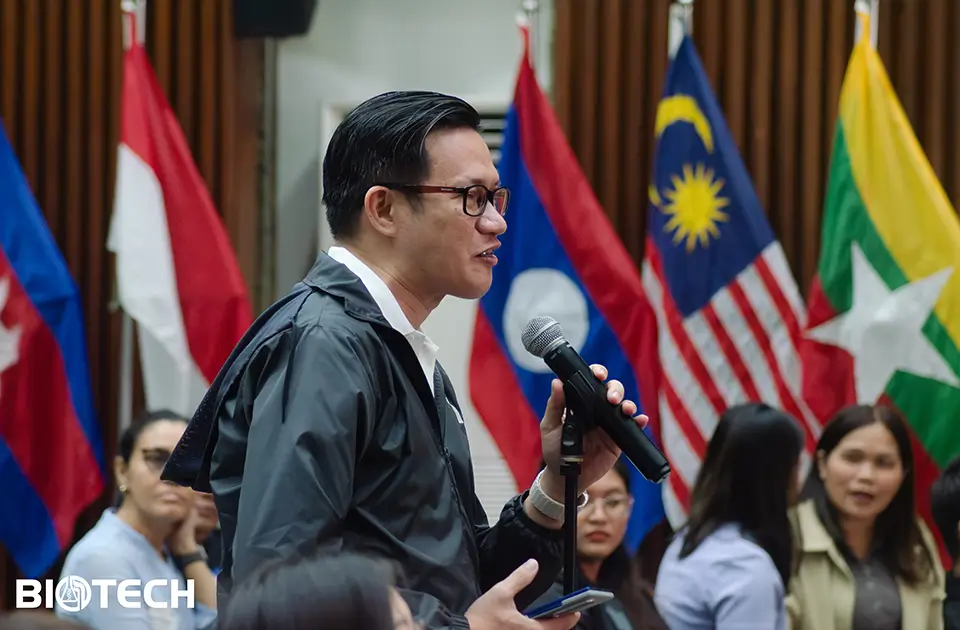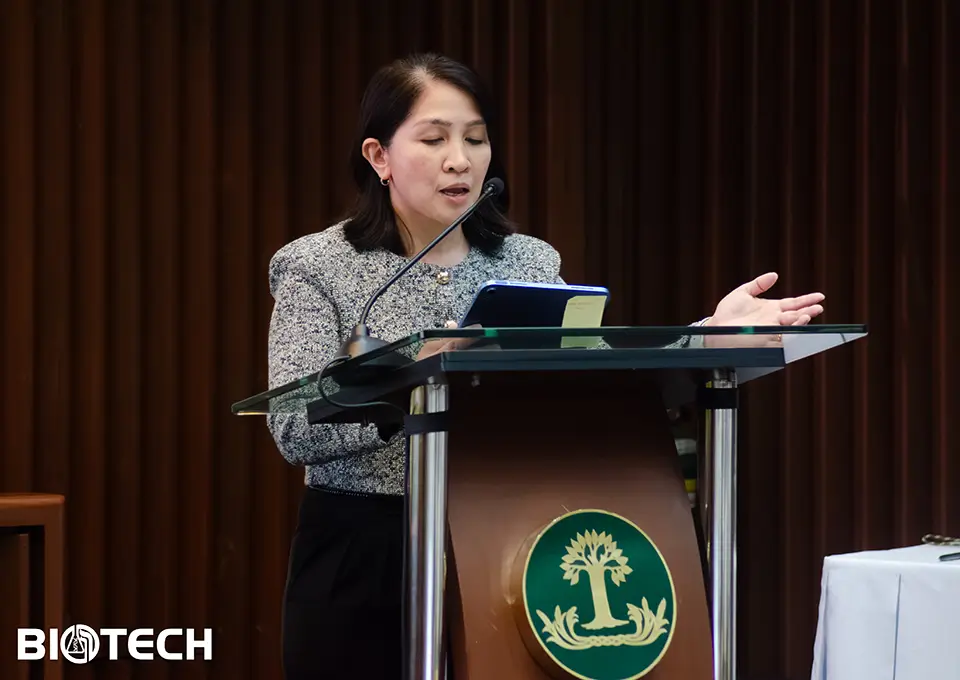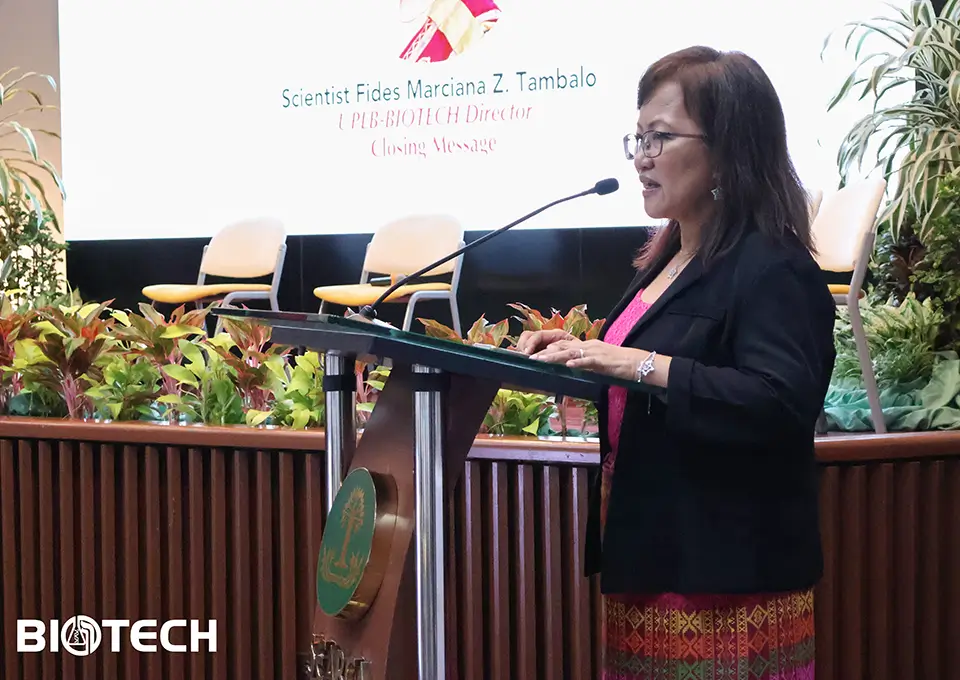LOS BAÑOS, Philippines—Fifty-eight agri-biotech stakeholders from academic institutions, government regulatory agencies, and the private sector joined the forum on "Bridging Biotechnology Innovation and Regulations: Orientation on Microbial-based Product Development and Commercialization in the Academic Setting" held on 18 September 2025 at the Southeast Asian Regional Center for Graduate Study and Research in Agriculture (SEARCA) to map practical ways to speed up rigorous approval of microbial-based products developed in academic institutions.
Co-organized by the University of the Philippines Los Baños (UPLB) National Institute of Molecular Biology and Biotechnology (BIOTECH) and SEARCA, the forum focused on improving researchers' and government regulators' mutual understanding of the processes and constraints in the registration and approval of microbial-based products and technologies for commercial agricultural and food use.
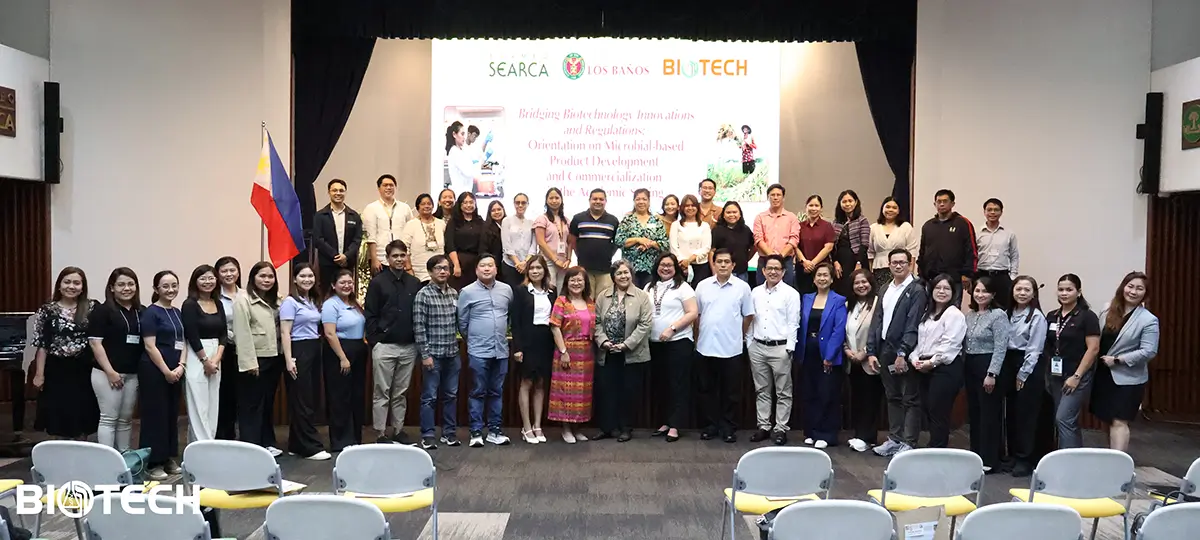 Agri-biotech stakeholders from academic institutions, government regulatory agencies, and the private sector participate in the forum to streamline registration and approval processes of microbial-based products and technologies in the academic setting.
Agri-biotech stakeholders from academic institutions, government regulatory agencies, and the private sector participate in the forum to streamline registration and approval processes of microbial-based products and technologies in the academic setting.
In her opening remarks, Dr. Mercedita Sombilla, SEARCA Center Director, emphasized that in the commercialization or deployment of developed technologies "regulation should not be a barrier; it should be a bridge—a bridge built with trust, clarity, and scientific integrity." She said the forum is a continuation of SEARCA's shared commitment to biotechnology and serves as a platform to listen, learn, and link arms across various disciplines.
"We are here to encourage a dialogue that is open, forward-thinking, and grounded in shared purpose," she affirmed.
Dr. Marian De Leon, UPLB Assistant to the Vice Chancellor for Research and Extension, stressed in her opening remarks that the UPLB Office of the Vice Chancellor for Research and Extension (OVCRE) is fully committed to supporting the researchers in their efforts to explore streamlining in the regulatory process for technologies developed in the academic setting.
"We see today's activity as an important step toward building a more collaborative environment where our collective efforts can hopefully lead to a framework that genuinely supports, rather than hinders scientific progress," she added.
Dr. Mercedita Sombilla (left), SEARCA Center Director, and Dr. Marian De Leon (right), UPLB Assistant to the Vice Chancellor for Research and Extension, underscore the importance of the forum in their remarks. (Photos by UPLB-BIOTECH)
Three UPLB experts shared their experiences in developing agriculture and food technologies, and the intellectual protection and commercialization pathways in the academic setting.
Dr. Mannix Pedro, UPLB-BIOTECH Deputy Director for Research, Development, and Extension, presented the institute's research, development, extension, and technical services programs. He said it has developed more than 50 biotech products and technologies in 45 years, including nitrogen fixers (Bio N, NitroPlus, NitroLink), phosphorous and zinc solubilizers (Biosol-P, PhosphoLink, Oryzinc, Maizinc), potassium mobilizer (K-SolB), nutrient uptake enhancers (Mykovam, MykoPlus, Mykorich, Mykocap, Vamri, Brown Magic), micronutrient enhancer (Fermented Plant Juice), growth stimulants (BioGroe, Micro Mix), biocontrol agents (Bio Y, BioPlasma, HiYeast, ActiCon, WiltCure), and organic matter (Bioquick, Bio Fix, Nature's Way Compost Activator). His presentation focused on microbial-based inoculants, covering product development, quality assurance, up-scaling, adoption, potential impact, and registration. He noted that state universities and colleges (SUCs) and research and development institutes (RDIs) face several barriers in commercializing publicly funded technologies.
"One major challenge is that regulatory requirements are often designed for companies, making it difficult for academic institutions to comply," he said.
This was reiterated by Dr. Rodney Perez, UPLB-BIOTECH Scientist I and Program Leader for Food, Feed, and Specialty Products, who stressed the need to revisit existing regulatory processes and consider the landscape of academic research institutions in their registration process.
"The protocols of these regulatory agencies are designed for industrial-scale production, which is not the mandate of academic research institutions such as UPLB-BIOTECH," he said.
Dr. Perez shared his program's experiences in developing innovations for food, feed, and specialty products, including the challenges of regulatory compliance and product registration. Over 45 years, his program developed 20 technologies and secured 23 intellectual property rights. He said two national policies were adopted based on the completed R&D projects of UPLB-BIOTECH. Their outputs include Protein Enriched Copra Meal or PECM® (animal feed), Monascus Red™ (food-grade colorant), ImmunoDefense® (animal probiotics), Diaferin™ (raw material for dietary supplement against diabetes), and PhenoFera™ (cosmetic raw material). Challenges he cited include the lack of a dedicated pilot-scale production facility, regulatory jurisdiction ambiguity, and stringent regulatory requirement for novel microbial-derived compounds.
Atty. Melo Jean Triños-Peralta, Development Management Officer at the UPLB Technology Transfer and Business Development Office (TTBDO), discussed the legal backbone of technology transfer—Republic Act 8293 (Intellectual Property Code), Republic Act 10055 (Technology Transfer Act), Republic Act 9168 (Plant Variety Protection), and the UP IPR Policy. She also presented commercialized technologies of UPLB such as Bio N, PECM®, Nutrio, and Microbial Rennet. She said "technology should be reaching the public, and the results of government-funded research and development must be utilized for the greatest benefit of the people."
From left: UPLB experts Dr. Mannix Pedro, Dr. Rodney Pere), and Atty. Melo Jean Triños-Peralta share their experiences in developing agriculture and food technologies, and the intellectual protection and commercialization pathways in the academic setting. (Photos by UPLB-BIOTECH)
The afternoon panel discussion to surface the concrete next steps featured five government regulatory agencies. Four were from the Department of Agriculture (Fertilizer and Pesticide Authority, Bureau of Animal Industry, Bureau of Agriculture and Fisheries Standards, and Bureau of Plant Industry) and one was from the Department of Environment and Natural Resources (the Environmental Management Bureau).
To move forward, a key recommendation was to promote regulatory flexibility for academic institutions by classifying them as formulators or non-commercial manufacturers and reviewing requirements specific to academic setting. Other recommendations were to pursue legislative reforms to amend outdated laws and introduce policy innovations such as a regulatory sandbox under the Philippine Innovation Act. Moreover, academic research institutions are encouraged to continue engaging with government regulators to discuss policy revisions for a streamlined registration and approval processes for their microbial-based products and technologies.
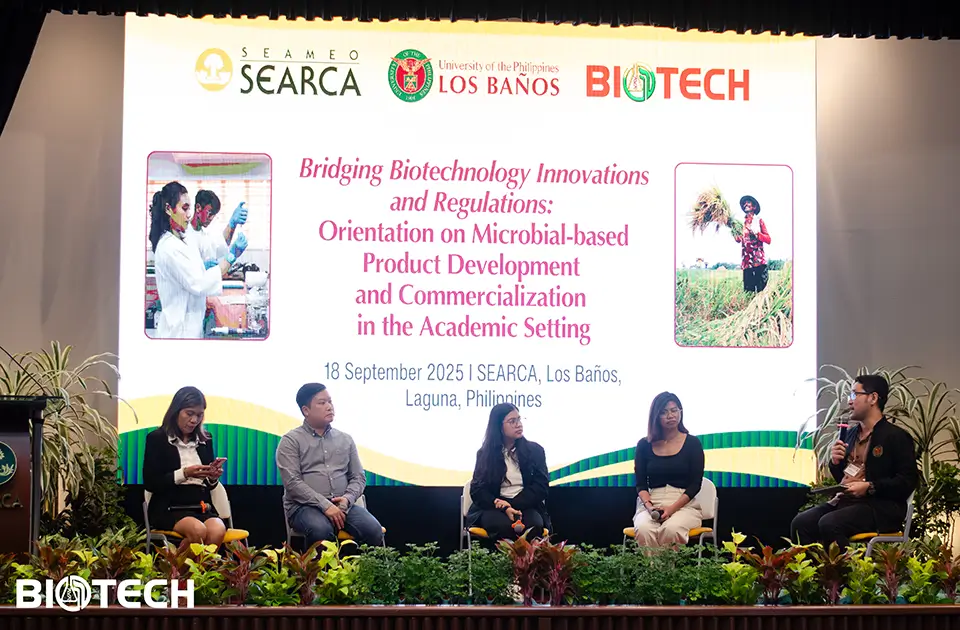 Representatives from government regulatory agencies during the panel discussion as one representative participates via Zoom
Representatives from government regulatory agencies during the panel discussion as one representative participates via Zoom
The researchers present in the forum came from UPLB, De La Salle Lipa, Isabela State University, Central Luzon State University, and Pampanga State Agricultural University.
Participants from the academic institutions share their experiences and queries during the open forum.
UPLB-BIOTECH Director Fides Marciana Tambalo highlighted that the forum was vital for starting a dialogue between the government regulatory agencies and academic research institutions.
"I hope that the conversations we began here will not end today. Rather, let them be the spark toward stronger coordination, more responsive regulatory pathways, and eventually, policy change. With this, we can ensure that locally developed, science-based, and sustainable technologies can reach the hands of those who need them most," she said.
